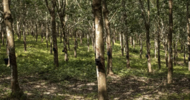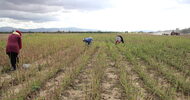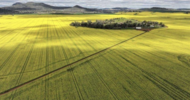Globe & Mail | 24 November 2010
Saskatchewan has some of the richest and least expensive farmland in the world, and there's a gigantic pool of global money that would like to buy up as much of it as they can, and then lease it back to the farmers to operate. In the next few years one of the hottest debates in agriculture will be about how much land these funds will be able to buy, and what happens once farming decisions are made in the boardroom.
On Wednesday from noon to 1 p.m. ET we hosted a live discussion on this issue with Tom Eisenhauer, President, Bonnefield Financial Inc.
(Transcript of the live discussion follows)
Why corporate Canada is very interested in buying the farm
(11/24/2010)Wednesday November 24, 2010
11:41
Shane Dingman:
We're going to be starting up at noon, feel free to begin submitting questions now.Wednesday November 24, 2010 11:41 Shane Dingman
11:42
[Comment From Tom Eisenhauer, BonnefielTom Eisenhauer, Bonnefiel: ]
Hi. Happy to join you today for your online discussion.Wednesday November 24, 2010 11:42 Tom Eisenhauer, Bonnefiel
11:46
Shane Dingman:
Thanks for joining us Tom, for readers Mr. Eisenhauer is the President, of Bonnefield Financial Inc. and was quoted in today's story by Paul Waldie, who will also be joining us at noon. Read the story here: http://tgam.ca/BIIcWednesday November 24, 2010 11:46 Shane Dingman
11:55
Paul Waldie:
Looking forward to it!Wednesday November 24, 2010 11:55 Paul Waldie
11:56
Tom Eisenhauer:
Shane - but the look of many of the comments posted in response to Paul Waldie's story this morning, it looks like there is a general concern about "corporate" farms and "foreigner's buying up farmland". Let me begin by saying clearly, we at Bonnefield do not advocate foreign ownership of Canadian farmland. Our programs are intended for Canadian farmers who need to raise capital and reduce debt to expand their operations. We believe Canadian farmers should farm Canadian farmland and that Canadian farmland should be owned by Canadians.Wednesday November 24, 2010 11:56 Tom Eisenhauer
11:58
Shane Dingman:
Thanks for that Tom, by the way I'm one of the online editors here at The Globe and Mail, and I'll be posting your comments and questions for Paul and Tom to debate and answer.Wednesday November 24, 2010 11:58 Shane Dingman
11:59
Shane Dingman:
I wanted to include one note from a globeandmail.com commenter to kick us off:Reader eggfarmer says
"UN predicts that 230,000 people are added to the worlds population every day. It took 12 years for the last billion to be added. These people have to eat something, and the richer people get the higher their protein demands are....
do the math, it doesnt take a rocket scientist to figure out why the money is interested in farms.
id say that makes farmland even hotter than apple stock right now..."
Wednesday November 24, 2010 11:59 Shane Dingman
12:00
Tom Eisenhauer:
I don't disagree that population growth is one of the fueling factors of the interest in farmland. This, along with climate change, water shortages, etc. is raising investor interest in farmland as an investment asset.Wednesday November 24, 2010 12:00 Tom Eisenhauer
12:01
[Comment From MA HendrikxMA Hendrikx: ]
The vast majority of farms, whether corporate or not, are owned by families who do the work and manage the business themselves. Why is it so important to expand, why do we assume that bigger is better, instead of a decent day's work having some value?Wednesday November 24, 2010 12:01 MA Hendrikx
12:03
Tom Eisenhauer:
From what farmers are telling us, larger farms enable them to reach economies of scale in production, The end result is lower costs, better profitability and more productivity of farming operations. Scale matters to farmers just as it does in other industries.Wednesday November 24, 2010 12:03 Tom Eisenhauer
12:03
[Comment From Michelle KienitzMichelle Kienitz: ]
I'd like to hear how these investments would react to an economic crisis. Also will these farmers have reduced access to credit now that they have less assets?Wednesday November 24, 2010 12:03 Michelle Kienitz
12:05
Tom Eisenhauer:
No investment is totally immune to crisis. But even in crisis times, people still have to eat! Your Q about reduced assets is a good one. Most farmers need to keep some farmland and other assets on their books to properly enable them to finance their working capital and bank lines etc.Wednesday November 24, 2010 12:05 Tom Eisenhauer
12:05
[Comment From k_smithk_smith: ]
I am having problems with the "control" factor. Why wouldn't a corporation that owns the farmland hire cheaper labor say from Mexico to farm the land and sell the product to the highest bidder in the market?Wednesday November 24, 2010 12:05 k_smith
12:06
Paul Waldie:
Hey MA: The fact is that most farms in Canada are just too small to compete internationally and don't generate enough revenue for families to earn a sufficient living from farming alone.Wednesday November 24, 2010 12:06 Paul Waldie
12:07
Tom Eisenhauer:
Let's be clear here. Under our lease programs the farmer stays in total control of his farming operations. All they need to do is pay their rent on time and adhere to certain environmental standards to ensure the productivity of the farmland is protected and enhanced. Investors have no say over the farming operations.Wednesday November 24, 2010 12:07 Tom Eisenhauer
12:08
Tom Eisenhauer:
I agree with Paul. Our Canadian farmers are competing against huge 100,000+ acre farms elsewhere in the world. They need to compete too.Wednesday November 24, 2010 12:08 Tom Eisenhauer
12:08
[Comment From Cathy HCathy H: ]
Economies of scale are a bit of a myth. It is actually the opposite: the large holdings have a lower return per acre, but with that many more acres per farm the total revenue is higher, giving the operator more income.Wednesday November 24, 2010 12:08 Cathy H
12:09
Paul Waldie:
The point about cheap labour is interesting, but I'm not sure farming is like other businesses where hiring cheap workers can drive profits. The key to farming is having someone who knows what they are doing and who is experienced not only in the crops being planted but in the overall growing conditions of that area. It would be pretty hard to just drop someone on to a farm and expect him or her to make it productive.Wednesday November 24, 2010 12:09 Paul Waldie
12:09
Tom Eisenhauer:
Cathy - that simply hasn't been the experience with our farmer partners. They have experienced significantly higher per-acre returns as they scale up.Wednesday November 24, 2010 12:09 Tom Eisenhauer
12:09
[Comment From MA HendrikxMA Hendrikx: ]
As a farming family that has embraced technology to expand as it makes sense, I have to say cheap labour isn't that cheap in Canada - part of our productivity issue is the value of the $ and the costs of operating in a first world countryWednesday November 24, 2010 12:09 MA Hendrikx
12:10
Tom Eisenhauer:
Dr. Sparling's studies confirm that labour costs are a fairly small component of total farm costs. Farming has become much more capital intensive over the past 20 years.Wednesday November 24, 2010 12:10 Tom Eisenhauer
12:11
Paul Waldie:
One area we did not get a chance to explore on the financing front is the role of banks, credit unions and the Farm Credit Corp. I'd love to hear what folks out there think of these institutions. Are they working? Especially FCC which has expanded its role a fair bit in recent years.Wednesday November 24, 2010 12:11 Paul Waldie
12:11
Shane Dingman:
Tom, Paul, to the second part of that question from MA, have you found that land costs and operating costs are scaling up too fast for family farmers?Wednesday November 24, 2010 12:11 Shane Dingman
12:12
Tom Eisenhauer:
As Paul's story about Wigmore farms yesterday pointed out, the economic farming unit in Sask these days is around 10,000 acres.Wednesday November 24, 2010 12:12 Tom Eisenhauer
12:12
Tom Eisenhauer:
Re FCC - they have a $17b portfolio of farm loans. Farmers need access to alternative sources of capital too.Wednesday November 24, 2010 12:12 Tom Eisenhauer
12:13
Tom Eisenhauer:
Re: Land costs - yes we have found many family owned farm companies find the cost of land prohibitive - especially when they want to acquire large acreages to increase scale. That is one of the reasons they find farmland leasing attractive.Wednesday November 24, 2010 12:13 Tom Eisenhauer
12:14
[Comment From David HDavid H: ]
Who do you see as the investors of the future? Is it the laarge Canadian Pension funds or Foreign funds or specialty funds?Wednesday November 24, 2010 12:14 David H
12:14
Paul Waldie:
Land costs are tricky to figure out because the rules vary so much from province to province. That's one issue that really struck me doing this story, just how different each province is when it comes to owning farmland.Wednesday November 24, 2010 12:14 Paul Waldie
12:14
Shane Dingman:
To your point Paul, reader Nigel Tufnel1 wrote commented on your story today:"This has occurred all over Ontario; not a peep from the media over the past 30 years."
Wednesday November 24, 2010 12:14 Shane Dingman12:15
Tom Eisenhauer:
We at Bonnefield hope that we can encourage Canadian investors to invest in Canadian farmland before non-Canadians do.
Wednesday November 24, 2010 12:15 Tom Eisenhauer12:15
[Comment From Patricia BertrandPatricia Bertrand: ]
So, are we going to find farms listed on the TSX?
Wednesday November 24, 2010 12:15 Patricia Bertrand12:15
Paul Waldie:
David H: It's already happening and only a matter of time before the big pension funds in Canada, ie Teachers, OMERS and CPP, get into this.
Wednesday November 24, 2010 12:15 Paul Waldie12:16
Paul Waldie:
Patricia: Some farm funds are already public, ie Black Earth is listed in Sweden. I think we will soon see one or two farmland REITs in the US too.
Wednesday November 24, 2010 12:16 Paul Waldie12:16
Tom Eisenhauer:
Patricia - Canadian investors are investing hundreds of millions of dollars in places like Uruguay. Wouldn't it be nice if Canadian farmers could attract some of that capital as well. If a TSX listing helps, maybe it should be considered.
Wednesday November 24, 2010 12:16 Tom Eisenhauer12:16
[Comment From Alan Duncan- UPEIAlan Duncan- UPEI: ]
in any other business the model has been that capital assets are primarily leased and not owned by the operator ( airlines, hotels, shipping etc) Why does the agricultural model continue having the operator owning the bulk of the capital asses, including land.
Wednesday November 24, 2010 12:16 Alan Duncan- UPEI12:17
Tom Eisenhauer:
Good point Alan. I don't own the office I'm sitting in. I lease it. If I had to own it (like we expect farmers to do) the debt load would crush my business.
Wednesday November 24, 2010 12:17 Tom Eisenhauer12:17
Paul Waldie:
Alan: I also think it goes back to ownership rules. It is still very difficult to buy farmland in many provinces, as I'm sure Tom can tell you.
Wednesday November 24, 2010 12:17 Paul Waldie12:18
Shane Dingman:
Speaking of debt loads ...
Wednesday November 24, 2010 12:18 Shane Dingman12:18
[Comment From MA HendrikxMA Hendrikx: ]
Curious that we're discussing raising more capital at a time when economic studies show that Canadian farmers are dangerously overextended when you factor in the return on investment.
Wednesday November 24, 2010 12:18 MA Hendrikx12:19
Tom Eisenhauer:
Yes studies whow Canadian farmers carry too much debt. Leasing is an alternative than can help them reduce their debt load. This is a big reason we see so much interest in our programs from the farm community.
Wednesday November 24, 2010 12:19 Tom Eisenhauer12:20
Shane Dingman:
These two readers have fairly similar desire to see public investment over private... is there any sign that governments might want to engage in similarly large-scale land-lease programs?
Rick Taves1
In the the prairie provinces, noted for simple common sense, farmers have long grazed their cattle on publicly owned land. They have not had to tie up their capital. If ownership of farm land is too costly for farmer producing grain, pulses and other commodities, would not public ownership make sense? Better than allowing urban and foreign investors use it to play their bubble games, all the while demanding ever increasing rents to keep their profit machines going.
Zanie57
With the trend returning to 'LOCAL' I would imagine that the government of Canada should be providing our farmers with the 'BAIL OUT' the automotive industry received.Instead of losing agricultural land to corporations from out of the country (even from within the country) invest in recruiting, training and maintaining our own 'farmers'. Give them incentives to become food producers. Free education, low cost land, mentoring by the farming elders.
Wednesday November 24, 2010 12:20 Shane Dingman
12:20
Tom Eisenhauer:
A quick background point. We started Bonnefield in response to a challenge we faced in our own farming operation (we own Canada's largest sod farming operation). We wanted to reduce debt through a sale and leaseback but could not find a major financial institution in Canada that would help us - presto we started Bonnefield to do just this.Wednesday November 24, 2010 12:20 Tom Eisenhauer
12:20
Paul Waldie:
Farm debt loads in Canada are very high. Some studies have shown the debt to income ratio for farmers here is five times higher than in the US. However, bankruptcy rates among Canadian farmers remain fairly low. But one has to wonder if that will continue.Wednesday November 24, 2010 12:20 Paul Waldie
12:21
Tom Eisenhauer:
Re public ownership of farmland - do we really want our governments to be using their scarce resources to buy up farmland at a time of huge deficits? Wouldn't it be better to use private capital to help Canadian farmers instead?Wednesday November 24, 2010 12:21 Tom Eisenhauer
12:22
Tom Eisenhauer:
I totally agree, however, that Canada desperately needs a comprehensive agriculture policy addressing many of your reader's concerns.Wednesday November 24, 2010 12:22 Tom Eisenhauer
12:23
Paul Waldie:
Well re "bail out", considering we spend more than $8-billion on agriculture annually in this country, that's a lot more than GM and Chrysler received in their one time bail outs. We do have to ask some hard questions about what we are getting for that money.Wednesday November 24, 2010 12:23 Paul Waldie
12:23
[Comment From calgaryrabbitcalgaryrabbit: ]
This is the saddest thing I have heard in decades. It was these hard working brave families who forged civilization in our west.Wednesday November 24, 2010 12:23 calgaryrabbit
12:23
[Comment From Patricia BertrandPatricia Bertrand: ]
Personally, I've felt frustrated hereing from farmers the difficulties they face to provide food for their neighbors. I have wished that I would be able to help them. Why should any particular group of people be forced to live in what amounts to poverty if there is a better way?Wednesday November 24, 2010 12:23 Patricia Bertrand
12:23
Tom Eisenhauer:
Good point Paul. Privately, politicians and policy makers acknowledge that they can no longer support losing propositions. They need to back winners.Wednesday November 24, 2010 12:23 Tom Eisenhauer
12:24
Shane Dingman:
Speaking of winners:Wednesday November 24, 2010 12:24 Shane Dingman
12:24
[Comment From john dixonjohn dixon: ]
I used to live in southwest Ontario. Once upon a time Canagra (Euro/Swiss? outfit) bought up the majority of the single family farms (~200 acres), tore down all the barns and fences and turned them into monoculture canola, corn and wheat parcels of thousands of acres each. About 15 years ago, Canagra went bust and the recievers sold off a bunch of the more marginal properties. A huge outflux of old order Mennonites from the Kitchener area bought in and put the fences back up, built old wooden barns and split the properties back into 100 acre mixed farming operations. They've been amazingly successful at it, but probably because they have large families and the whole family including the little kids, work sunup to sundown 6 days a week for free. Nontheless, it was nice to see: a welcome change from 5000 acres of canola with a couple of intensive hog barns in the middle, staffed by one guy.Wednesday November 24, 2010 12:24 john dixon
12:24
Tom Eisenhauer:
Patricia - I agree. One way to help the farm community is to provide them with easier access to growth capital. Leasing is just one such alternative.Wednesday November 24, 2010 12:24 Tom Eisenhauer
12:26
Paul Waldie:
Yes Patricia it is a complicated issue. Quebec has a system that basically guarantees farmers a certain income. But the system is now so expensive two government sponsoured reports have recommended sweeping changes to cut it back.Wednesday November 24, 2010 12:26 Paul Waldie
12:26
Tom Eisenhauer:
Comment to John - kudos to the Mennonites in your comment. I mean that. It is great to see. But not many farmers want to live that way. They want to grow their businesses and make a profit.Wednesday November 24, 2010 12:26 Tom Eisenhauer
12:27
[Comment From Cathy HCathy H: ]
What happens if a Canadian investment company is taken over by a foreign company. Would land purchased under farmland ownership rules that restrict foreign ownership have to be divested?Wednesday November 24, 2010 12:27 Cathy H
12:28
Tom Eisenhauer:
Yes it would have to be divested if it is in provinces like SK and MB. The same holds true now. If a foreign mortgage lender has to realize on farmland that they lended against, they are given a certain period of time in which to divest it.Wednesday November 24, 2010 12:28 Tom Eisenhauer
12:28
Paul Waldie:
I wonder if Tom could also expain why Canadian pension funds can't buy farmland in Sask? Why don't they fit the Canadian ownership rule?Wednesday November 24, 2010 12:28 Paul Waldie
12:30
Tom Eisenhauer:
Paul - a strict interpretation of the rules in SK say that if any entity (corporate or otherwise - including pension funds) has even one non-Canadian "member" then it can not hold more than 10 acres of farmland. I would suggest that this is a pretty restrictive rule. Even a SK-based pension fund would be prevented from investing in SK farmland on this basis.Wednesday November 24, 2010 12:30 Tom Eisenhauer
12:32
Tom Eisenhauer:
Further to Paul's Q - there are many industries in this country that are considered "strategic" or of key cultural importance. But we have found other ways of protecting Canadian interests in these industries without forcing the kinds of restrictions that we see on farmland in SK.Wednesday November 24, 2010 12:32 Tom Eisenhauer
12:32
Paul Waldie:
Also for Tom: We hear all kinds of stories about huge farms in Ukraine, Russia etc. How big has farmland investing become outside of Canada and the U.S.?Wednesday November 24, 2010 12:32 Paul Waldie
12:32
Shane Dingman:
Reader Lancer doesn't sound very happy about the prospects of pension funds, or any corporate body, owning farmland:The idea of corporate ownership of farms is deplorable, much like the old Soviet collective farms. Essentially it is like asking a mom and pop store that has existed for generations on main street to close down and have the family go work for Wal-Mart. In this case however we aren't talking about non-essential items like salad shooters and fishing rods, we're talking about the food security of a nation. Do you want your food security controlled by a corporation that has profits in mind over everything else ?
Wednesday November 24, 2010 12:32 Shane Dingman12:33
[Comment From Ron HRon H: ]
Doe you ever start to think that larger corporatized farms start to resemble the Soviet Union style of farming which of course proved to be a great success!
Wednesday November 24, 2010 12:33 Ron H12:33
Tom Eisenhauer:
Paul - very big indeed. We have heard estimates ranging from $15b to $25b being invested in farmlands in eastern Europe, South America, Australia, etc. Almost none to date in Canada.
Wednesday November 24, 2010 12:33 Tom Eisenhauer12:35
Tom Eisenhauer:
Ron - I think you'll agree that the Soviet model didn't work for many reasons unrelated to size and scale. Central planning simply doesn't work (except maybe in China)
Wednesday November 24, 2010 12:35 Tom Eisenhauer12:35
[Comment From GregoryGregory: ]
I'm currently a 2nd year Business Student and extremely interested in the agricultural industry, specifically the corporate aspects of it as my focus. Are you hiring students such as myself?
Wednesday November 24, 2010 12:35 Gregory12:35
Shane Dingman:
Aside from Gregory's naked appeal for a job, Tom are you seeing a lot of competition spring up to offer the kind of financing Bonnefield specializes in?
Wednesday November 24, 2010 12:35 Shane Dingman12:35
Paul Waldie:
Well Lancer, I think food security already is controlled by corporations and families trying to make a profit. The largest farms in Canada are basically family run businesses, and they want to make money just like any other family controlled company (Rogers? Shaw?)
Wednesday November 24, 2010 12:35 Paul Waldie12:36
Tom Eisenhauer:
Greg/Paul - we are seeing lots of interest in the topic but to date, the level of interest has not been matched by the amount of investment capital (which to date has remained relatively modest). Partly this is a function of the ownership restrictions in place in SK and MB, etc.
Wednesday November 24, 2010 12:36 Tom Eisenhauer12:37
Tom Eisenhauer:
Paul - to put it in perspective, there was probably $10mm to $20mm invested by all of Canada's farmland funds in total last year across the country. This compares to billions of dollars worth of farmland transactions that occur in any given year.
Wednesday November 24, 2010 12:37 Tom Eisenhauer12:38
Shane Dingman:
This reader raises the issue of declining farm populations, but I wonder if alternative financing addresses this issue, or if it's an issue at all in your minds?
Masdar says:
"Since the 2001 census there has been a 7.1 per cent decline in farm operations and a 5.5 per cent decline in farm operators – a loss of nearly 20,000 Canadian farmers from all sectors. As well the farm population continues to age, with the number of farmers under 35 declining to 9.1 per cent, and the overall average age of Canadian farmers rose from 49 to 52. ... This is a serious issue if Canadians allow multinational corporations to control the Agricultural land base in Canada."Wednesday November 24, 2010 12:38 Shane Dingman
12:38
Paul Waldie:
Greg: One thing that is very interesting to me is the drop in the number of students enrolling in ag studies at universities. I have heard the numbers have shrunk considerably so it's interesting that you are coming at this as a business student.Wednesday November 24, 2010 12:38 Paul Waldie
12:40
Tom Eisenhauer:
Re Masdar's comment - Stats Can data show that teh amount of farmland in Canada has remained relatively constant at around 70mm hectares since 1956. But hte # of farms has dropped by about 50%. A clear indication that Canadian farms are increasing in scale. But they have much further to go to keep up with their international competition and Paul's article yesterday so articulately explained.Wednesday November 24, 2010 12:40 Tom Eisenhauer
12:40
Paul Waldie:
Masdar: That's a really important trend, particularly aging farmers. That's going to be a big issue going forward.Wednesday November 24, 2010 12:40 Paul Waldie
12:40
[Comment From CalvinCalvin: ]
Some of the most productive farms in this country are operated and owned by Hudderite Colonies. The government should encourage them to invest and expand more. Do you agree ?Wednesday November 24, 2010 12:40 Calvin
12:41
Tom Eisenhauer:
Masdar - a further point: we estimate that about $50b worth of farmland will have to change hands in Canada over the next decade or so due to aging farmers. How will the young growing farmers finance that? Leasing is but one alternative.Wednesday November 24, 2010 12:41 Tom Eisenhauer
12:41
Paul Waldie:
Well Calvin, that's a whole other issue. But I'm not sure the Hutterites want government intervention in what they do!Wednesday November 24, 2010 12:41 Paul Waldie
12:43
Tom Eisenhauer:
Calvin - I am no expert on Hudderite farms, so I'd better not express an opinion.Wednesday November 24, 2010 12:43 Tom Eisenhauer
12:43
Shane Dingman:
Great comment from reader Toronto_Tax_GuyI'm curious.
To those that want to deny farmers the right to decide to sell their properties to who they choose.
Are you also willing to give up your own personal property rights or just those of others?
Wednesday November 24, 2010 12:43 Shane Dingman
12:44
Tom Eisenhauer:
Shane - great comment from Toronto Tax Guy - but in all seriousness, why do we expect Canadian farm operators to build their businesses with all sorts of restrictive covenants that we don't place on other industries?Wednesday November 24, 2010 12:44 Tom Eisenhauer
12:44
Shane Dingman:
For some context, our Globe online poll on this question, about 45% of the voters are currently saying ownership needs to stay restricted...http://www.theglobeandmail.com/news/national/time-to-lead/global-food/the-land-rush-in-farm-country/article1810297/
Wednesday November 24, 2010 12:44 Shane Dingman
12:45
Paul Waldie:
But be careful Tax Guy, the feds just told shareholders of Potash Corp. they can't sell their shares to a foreign company and we have lots of other restrictions on ownership etc. all in the national interest, we are told.Wednesday November 24, 2010 12:45 Paul Waldie
12:45
Tom Eisenhauer:
Shane - I wonder how many of those 45% of respondents are farmers. Not many I suspect.Wednesday November 24, 2010 12:45 Tom Eisenhauer
12:46
[Comment From Patricia BertrandPatricia Bertrand: ]
Shane: The only problem I have with selling to others is if those others are foreign nationals. I strongly object to the rich from other countries buying up our country.Wednesday November 24, 2010 12:46 Patricia Bertrand
12:46
Paul Waldie:
I also think the poll reflects the fact that many Canadians, at least those living in cities, still have a romantic notion about farming that we really need to overcome. That isn't fair to farmers or consumersWednesday November 24, 2010 12:46 Paul Waldie
12:47
Tom Eisenhauer:
Shane - further point of clarification - I support some sort of foreign ownership controls on Canadian farmland. But I think that there could be a :made in Canada solution" to finding ways of attracting capital to the farm sector - allowing Canadian pension funds and public REITS to invest in farmland would be one such step.Wednesday November 24, 2010 12:47 Tom Eisenhauer
12:47
Shane Dingman:
To the foreign-ownership concerns, Has this been your experience Paul, Tom? Is there more acceptance about Bonnefield's investing once it's clear you run a Canadian company interested in keeping these assets in Canadian hands?Wednesday November 24, 2010 12:47 Shane Dingman
12:47
Tom Eisenhauer:
Patricia - plese see my previous comment - we support a "Made in Canada solution"Wednesday November 24, 2010 12:47 Tom Eisenhauer
12:48
Paul Waldie:
Patricia: But why? Foreigners already own huges parts of this country just like Canadian companies own large pieces of foreign countries. The land isn't going anywhere so who really cares who owns it?Wednesday November 24, 2010 12:48 Paul Waldie
12:49
Tom Eisenhauer:
Shane/Patricia - there is no question that there is a lot of foreign interest in owning Canadian farmland. I probably get 2 foreign enquiries for every 1 I get from a Canadian. Again - why I think there is a need for Canadians to be allowed to invest more easily in Canadian farmland (and agriculture generally)Wednesday November 24, 2010 12:49 Tom Eisenhauer
12:49
[Comment From Russ FreestoneRuss Freestone: ]
its interesting that the Canadian Farmers Union appears to be pushing back on this concept of leasing land - yet some farmers are embracing it to grow their business. why the difference in opinion?Wednesday November 24, 2010 12:49 Russ Freestone
12:50
Paul Waldie:
Russ, it's part of the great debate in farming. Hey, this is a very big sector with all kinds of differing opinions. Just go out West and ask some farmers what they think of the Canadian Wheat Board.Wednesday November 24, 2010 12:50 Paul Waldie
12:51
Tom Eisenhauer:
Russ - the NFU has a confusing stance on the issue. They decry land leasing schemes, yet complain about debt levels for Canadian farmers. Contradictory if you ask me. I can also say that their views do not represent the majority of views of our farmer partners who support the concept. One area where we do agree with the NFU - we believe that Canadian farmland should be operated by Canadian farmers.Wednesday November 24, 2010 12:51 Tom Eisenhauer
12:51
[Comment From KatieKatie: ]
I'm not sure if this is the proper forum for this, but I'm curious as to why we have yet to touch on the environmental concerns associated with increasing the scale of conventional farming? Perhaps we should be focusing time and money on learning about and ensuring the success of smaller-scale, organic, and environmentally-sustainable farms.Wednesday November 24, 2010 12:51 Katie
12:52
Paul Waldie:
Katie: You are right and that is one area we really should have looked into for this series. That is a big and growing part of farming in Canada.Wednesday November 24, 2010 12:52 Paul Waldie
12:53
Tom Eisenhauer:
Katie - this is indeed a great forum for raising environmental concerns. We believe that in the long-term, the value of farmland is tied to its productive capacity. We therefore have a comprehensive set of standards regarding soil quality, pesticide plans, crop rotations, etc. to ensure that the quality of our lands are protected and enhanced.Wednesday November 24, 2010 12:53 Tom Eisenhauer
12:54
Shane Dingman:
Another interesting comment from a reader:Quebermudes says:
Are we worried about the "death of the family pharmacy" because most pharmacists don't own the building where their pharmacy is set up? Of course not. The pharmacist is happier because it's cheaper, and it makes no difference at all to the consumer.Farms are no different. If a farmer wants to put his money into actual farmwork rather than land ownership, good for him. It makes food a bit cheaper for everyone and makes the farmer a bit more money.
Wednesday November 24, 2010 12:54 Shane Dingman
12:55
Tom Eisenhauer:
Katie - one other comment: If there is one (slightly sad) conclusion I have drawn from my several years of involvement in farmland is this - the world is desperate for food and needs to find ways to grow more and more. Organic has a role to play, but is unlikely to meet the growing demand for food in some of the world's poorest and hungriest nations.Wednesday November 24, 2010 12:55 Tom Eisenhauer
12:55
Shane Dingman:
As we're very close to the end of the hour I thought I'd ask our guest Tom if he had any final thoughts, or pitches, to make? And also Paul if you have anything you feel the discussion hasn't managed to touch on?Wednesday November 24, 2010 12:55 Shane Dingman
12:55
Tom Eisenhauer:
Qubermudes phrased the issue well. Why do we expect farmers to live and work under a double standard?Wednesday November 24, 2010 12:55 Tom Eisenhauer
12:57
Tom Eisenhauer:
As a final comment I'd like to say congrats to Paul and his Globe colleagues for bringing these issues to the front page of our national newspaper. We need to have a broad conversation about agriculture in Canada. I believe we have an opportunity to grow the sector enormously over the next decade and more, but we need to get our policies right in order to enable our Canadian farmers to feed the world. Well done.Wednesday November 24, 2010 12:57 Tom Eisenhauer
12:57
Paul Waldie:
I think we have actually covered a lot of ground. I find the whole area of farm financing interesting. It is such an expensive, complicated business to be in with so much at stake. Hopefully we can do many more stories on farming, agriculture and it's role in Canadian socieity.Wednesday November 24, 2010 12:57 Paul Waldie
12:58
Tom Eisenhauer:
Thanks PaulWednesday November 24, 2010 12:58 Tom Eisenhauer
12:59
Shane Dingman:
Then I guess there's not much else to say, but I encourage readers who wish to continue the debate to comment in the story article, here:http://www.theglobeandmail.com/news/national/time-to-lead/global-food/why-corporate-canada-is-very-interested-in-buying-the-farm/article1806269/comments/
And tune in tomorrow for our online video debate, as well as another chat on local food on Friday. Thanks again to our guests and readers.
Wednesday November 24, 2010 12:59 Shane Dingman
12:59
[Comment From Patricia BertrandPatricia Bertrand: ]
Thank you Globe And Mail for publicising this issue.













